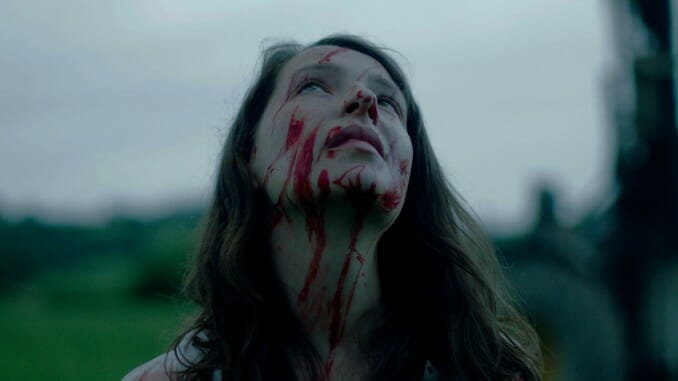Welsh Eco-Horror The Feast Is a Slow Burn Last Supper

As the eye of the climate change storm draws closer, the output of modern films has steadily amplified its reflection of humanity’s swelling eco-anxieties. These sentiments can be felt in Todd Haynes’ bio-drama Dark Waters or Steven Soderbergh’s period thriller No Sudden Move; the underwater dystopia of Reminiscence; the adolescent uncertainty in Mike Mills’ C’mon C’mon; and the arid wasteland of the exploited planet Arrakis in Dune. And the first shot of director Lee Haven Jones’ feature debut, The Feast, is that of our own planet’s most formidable opponent: An ugly oil rig, situated smack dab in the center of a rolling pasture. It relentlessly pummels into the ground to procure that precious liquid gold, while the worker in charge of handling the machinery stands idly by, indifferent to the destruction at play.
But the oil rig is as gawkily placed amidst the natural landscape as the multi-million dollar, rural Welsh home of Glenda (Nia Roberts) and her family: Wife to a member of Britain’s Parliament, mother to Guto (Steffan Cennydd), a junkie, and Gweirydd (Sion Alun Davies), a doctor-turned-triathlon trainee. With the hired help of Cadi (Annes Elwy)—a last-minute replacement for the local pub worker Glenda normally seeks out—Glenda prepares a sumptuous dinner meant to goad a longtime friend into selling her land for cash profit. On the side, Glenda and her husband Gwyn (Julian Lewis Jones) pillage untapped farmland for oil, with the help of their business associate Euros (Rhodri Meilir). The property owned by Mair (Lisa Palfrey) is one such patch of terrain that has yet to be explored. It could certainly yield little to no returns, but it could also be sheltering riches under its earthen flesh that would only serve to benefit the financially beset Mair and her husband.
In order to create the ideal conditions for persuading Mair to enter into an alliance with the three of them, high-strung, upper-class housewife Glenda must ensure that she assembles the perfect evening. Such a task is easier said than done, however. Cadi’s assistance proves somewhat inadequate, moving at a snail’s pace as if her own body does not belong to her. A trail of dirt seems to follow her wherever she goes. Barely vocal, Cadi is spacy and vacant as she interacts with Glenda and her uniquely disquieting family. Yet, the young woman feels things quite deeply, like when Gwyn’s shotgun goes off out in the woods nearby, signaling the pair of rabbits that he has killed for supper. When Gwyn enters the kitchen and slaps the two dead animals down on the countertop for Cadi to skin, she sprints out of the house and purges in the yard. She tenses at the discussion of murdered creatures and ravaged earth. She treads through the family’s home as if undressing it for her own ends.
-

-

-

-

-

-

-

-

-

-

-

-

-

-

-

-

-

-

-

-

-

-

-

-

-

-

-

-

-

-

-

-

-

-

-

-

-

-

-

-








































